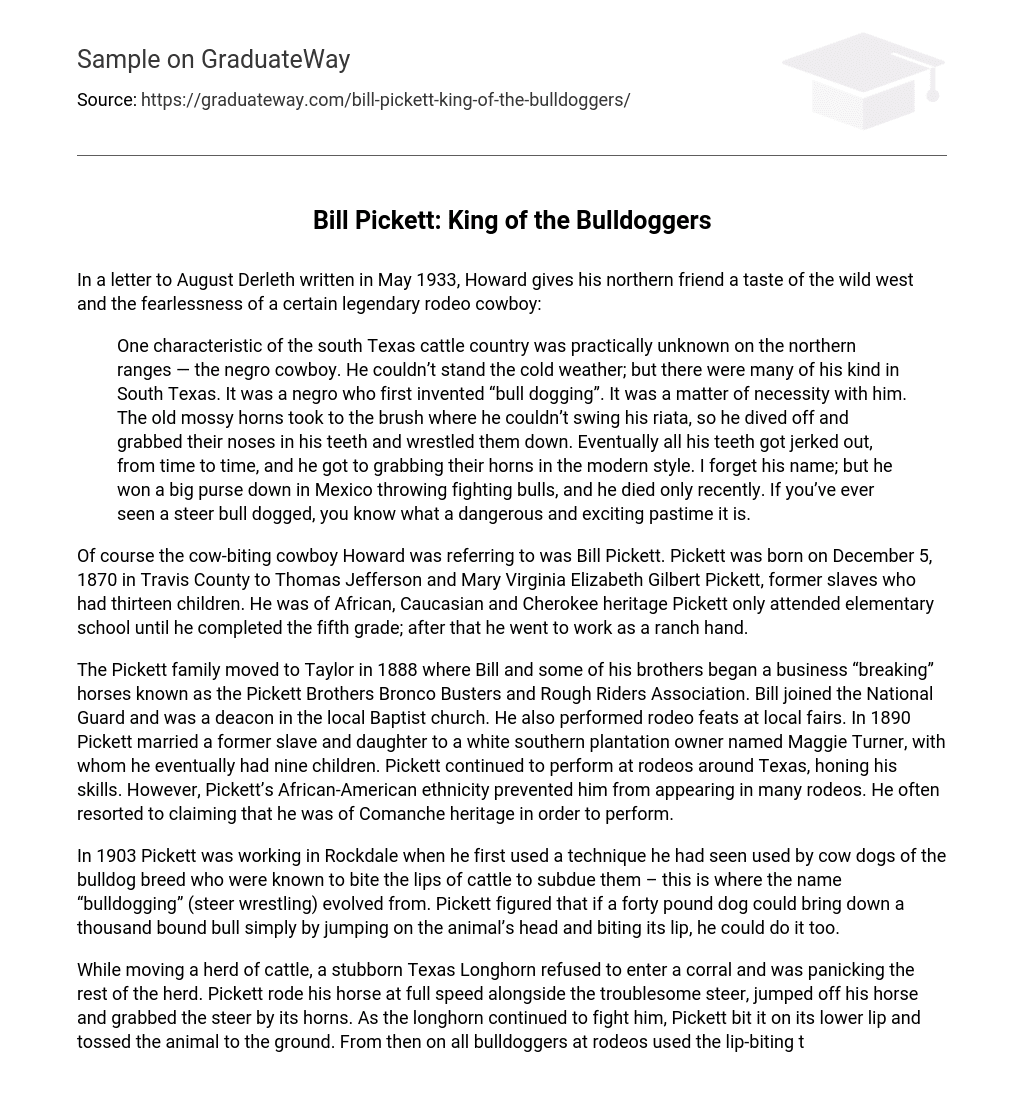In a letter to August Derleth written in May 1933, Howard gives his northern friend a taste of the wild west and the fearlessness of a certain legendary rodeo cowboy:
One characteristic of the south Texas cattle country was practically unknown on the northern ranges — the negro cowboy. He couldn’t stand the cold weather; but there were many of his kind in South Texas. It was a negro who first invented “bull dogging”. It was a matter of necessity with him. The old mossy horns took to the brush where he couldn’t swing his riata, so he dived off and grabbed their noses in his teeth and wrestled them down. Eventually all his teeth got jerked out, from time to time, and he got to grabbing their horns in the modern style. I forget his name; but he won a big purse down in Mexico throwing fighting bulls, and he died only recently. If you’ve ever seen a steer bull dogged, you know what a dangerous and exciting pastime it is.
Of course the cow-biting cowboy Howard was referring to was Bill Pickett. Pickett was born on December 5, 1870 in Travis County to Thomas Jefferson and Mary Virginia Elizabeth Gilbert Pickett, former slaves who had thirteen children. He was of African, Caucasian and Cherokee heritage Pickett only attended elementary school until he completed the fifth grade; after that he went to work as a ranch hand.
The Pickett family moved to Taylor in 1888 where Bill and some of his brothers began a business “breaking” horses known as the Pickett Brothers Bronco Busters and Rough Riders Association. Bill joined the National Guard and was a deacon in the local Baptist church. He also performed rodeo feats at local fairs. In 1890 Pickett married a former slave and daughter to a white southern plantation owner named Maggie Turner, with whom he eventually had nine children. Pickett continued to perform at rodeos around Texas, honing his skills. However, Pickett’s African-American ethnicity prevented him from appearing in many rodeos. He often resorted to claiming that he was of Comanche heritage in order to perform.
In 1903 Pickett was working in Rockdale when he first used a technique he had seen used by cow dogs of the bulldog breed who were known to bite the lips of cattle to subdue them – this is where the name “bulldogging” (steer wrestling) evolved from. Pickett figured that if a forty pound dog could bring down a thousand bound bull simply by jumping on the animal’s head and biting its lip, he could do it too.
While moving a herd of cattle, a stubborn Texas Longhorn refused to enter a corral and was panicking the rest of the herd. Pickett rode his horse at full speed alongside the troublesome steer, jumped off his horse and grabbed the steer by its horns. As the longhorn continued to fight him, Pickett bit it on its lower lip and tossed the animal to the ground. From then on all bulldoggers at rodeos used the lip-biting tactic. However, it has been gradually phased out of the bulldogging event at modern rodeos.
The new method of subduing bulls was such a hit, he was billed as the “Dusky Demon” and showed-off his bulldogging skills at rodeos, fairs and exhibitions all over the country. He first received national attention when he bulldogged a steer at the 1904 Cheyenne Frontier Days Rodeo, which had roughly the same appeal as today’s Super Bowl.
Pickett was far from a tall Texan, standing only five-seven and weighing about 145 pounds. His small stature certainly did not deter him or diminish his tenacity when going after and wrestling a full-grown steer to the ground. Pickett was also America’s first black cowboy movie star. He made two movies for the Norman Film Manufacturing Company of Florida — The Bull-Dogger and The Crimson Skull, both filmed in 1921. Unfortunately these films have been lost to time – only a few short clips exist today.
Pickett was so skillful at all things cowboy, in 1905 he joined the 101 Ranch Wild West Show. As a member of the troupe, Bill worked alongside other well known cowboys, namely Tom Mix, Will Rogers and Buffalo Bill. Pickett thrilled audiences all over the world with his extraordinary skills and talents. Though he did have a close call while performing in Mexico. It seems his lip-biting technique was considered an insult to the bull! Odd, considering the grievous punishment dealt to the bulls by the Mexican bullfighters. Luckily, Pickett and his companions managed to exit the arena unscathed. Pickett retired from the Wild West show in 1931 at the age of 60.
Pickett died on April 2, 1932 after being kicked in the head by a horse he was attempting to bridle. His final resting place is on what is left of the 101 Ranch property near Ponca City, Oklahoma. Will Rogers announced the funeral of his friend on his radio show, saying “Bill Pickett never had an enemy, even the steers wouldn’t hurt old Bill.”
Prior to his death Pickett had requested to be buried on Monument Hill. In 1936, the Cherokee Strip Cow Punchers Association erected a simple red sandstone marker at his gravesite that simply reads: Bill Pickett C.S.C.P.A.
Pickett was the first African-American to be elected to the National Cowboy Hall of Fame in 1971 and, in 1989, was named to the Pro Rodeo Hall of Fame. Today he is recognized the world over as The Greatest Cowboy and has a rodeo named in his honor.
In 1994 Pickett was honored with a U.S. postage stamp bearing his likeness as part of the Postal Service’s Legends of the Old West stamp series. But they got it wrong on the first go-round when they used his brother’s likeness instead of his.





